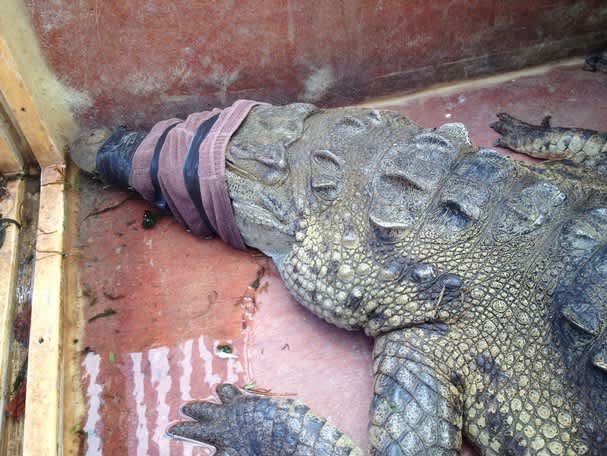Florida Crocodile Traveled 350 Miles from Birthplace
OutdoorHub Reporters 08.09.13

Wildlife officials discovered last month that an 11-foot American crocodile traveled more than 350 miles since it was born in 1999, setting the record for the longest distance traveled by any Florida crocodile. According to the Associated Press, the now 700-pound animal hatched near the Turkey Point nuclear power plant in Homestead, Florida and was captured near Lake Tarpon far to the north. Wildlife officials from the Florida Fish and Wildlife Conservation Commission (FWC) believe the crocodile has been living in the lake for about a year.
American crocodiles are widespread along northern South America, Central America and southern Florida. Crocodiles can coexist with alligators, and do so within the boundaries of Everglades National Park and certain other parts of the Sunshine State. There are an estimated 2,000 American crocodiles living in Florida. The town of Homestead contains an especially large population, possibly because of warmer waters. Crocodiles are not known to embark on long migrations, but this particular animal seems to have developed a knack for traveling. It was not the first time the FWC has heard about the croc, it was spotted in 2008 near a country club in Naples. Only 8-feet-long at the time, FWC trappers removed the crocodile and transported it to the Rookery Bay National Estuarine Reserve. The crocodile returned a year, but just to pass by. Eventually it ended up in the Manatee River and made its way to Lake Tarpon. The Tampa Bay Times reported that for a time the croc resided in the gated community of St. Petersburg’s Caya Costa and then disappeared, eventually finding a home in Lake Tarpon.
“He didn’t look anything like a gator,” said Wanda Vekasi, who found the croc and informed the authoriites. “He had big spikes sticking out of his tail. It just looked evil.”
It turns out that those same spikes were marked by biologists from Homestead and used to identify the large reptiles, as well as what they have been up to. Still, experts are puzzled why this particular crocodile made such a long journey from its birthplace. The FWC is now shipping the crocodile back to Homestead, where agency spokesman Gary Morse conceded it might not stay long.

